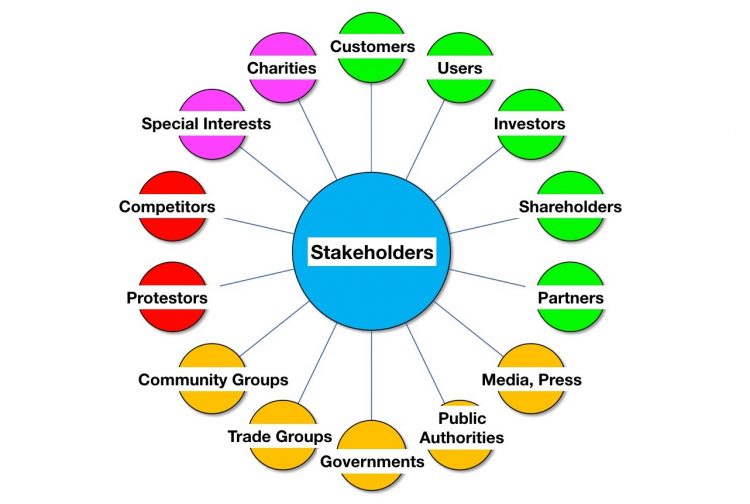Stakeholder management is a crucial aspect of any organization’s success. It refers to the process of identifying, analyzing, and engaging with individuals or groups who have a stake or interest in the activities, decisions, and outcomes of a particular project, program, or business. Stakeholders can include customers, employees, shareholders, suppliers, government agencies, local communities, and other organizations.
Effective stakeholder management involves understanding their expectations, needs, and concerns, and developing strategies to engage with them in a way that aligns with the organization’s goals and values. It is a critical skill for leaders, project managers, and anyone responsible for delivering results that satisfy multiple stakeholders.
Stakeholder Management Benefits
Effective stakeholder management provides several benefits to organizations, including:
- Building positive relationships: Engaging with stakeholders in a meaningful and transparent way can help build positive relationships based on trust, respect, and mutual understanding. This can lead to increased stakeholder loyalty and support.
- Managing risks and conflicts: By identifying and addressing stakeholder needs and concerns, organizations can manage potential risks and conflicts before they escalate, reducing the likelihood of negative impacts on the business.
- Enhancing reputation: Demonstrating a commitment to stakeholder engagement and social responsibility can enhance the organization’s reputation and brand value, leading to increased customer loyalty and support.
- Increasing innovation and creativity: By involving stakeholders in decision-making processes, organizations can tap into a diverse range of perspectives and ideas, leading to increased innovation and creativity.
- Improving business performance: By aligning stakeholder needs and expectations with the organization’s goals and values, organizations can improve business performance and create long-term value for all stakeholders. This includes improving financial performance, increasing market share, and attracting and retaining talent.
- Meeting regulatory requirements: Effective stakeholder management can help organizations meet regulatory requirements and avoid legal and financial penalties.
Overall, effective stakeholder management can help organizations create a more sustainable and equitable society, while also contributing to long-term business success.
What is Stakeholder Management with Example?
Stakeholder management refers to the process of identifying, analyzing, and engaging with individuals or groups who have an interest in the activities, decisions, and outcomes of a particular project, program, or business.
Effective stakeholder management involves understanding their needs and concerns and developing strategies to engage with them in a way that aligns with the organization’s goals and values. Here’s an example:
Let’s say a company is planning to build a new factory in a rural area. The company’s stakeholders might include the local community, the government, environmental groups, suppliers, and customers. Effective stakeholder management in this case would involve:
Identifying and analyzing the stakeholders:
The company would need to identify all the stakeholders who may be impacted by the factory’s construction and operation, including those who are directly and indirectly affected.
Understanding their needs and concerns:
Once identified, the company would need to understand the stakeholders’ expectations, needs, and concerns related to the project. For example, the local community might be concerned about the potential impact on the environment, while suppliers might be interested in new business opportunities.
Developing a stakeholder engagement strategy:
Based on the analysis, the company would need to develop a strategy to engage with each stakeholder group, taking into account their needs and concerns. This could involve community consultations, government approvals, environmental impact assessments, and supply chain partnerships.
Managing stakeholder relationships:
Throughout the project’s lifecycle, the company would need to manage its relationships with stakeholders by providing timely updates, responding to feedback and concerns, and ensuring transparency and accountability.
By effectively managing its stakeholders, the company can build positive relationships and minimize the risk of conflicts, delays, and reputational damage. Stakeholder management is an essential skill for any organization that wants to operate in a socially responsible and sustainable manner.
What are the 7 Principles of Stakeholder Management?
There are various principles and frameworks that can guide stakeholder management, but here are seven widely recognized principles:
- Identify stakeholders: Identify all stakeholders who may be affected by the organization’s actions, decisions, and outcomes. This includes both internal and external stakeholders, such as employees, customers, suppliers, shareholders, government agencies, local communities, and NGOs.
- Understand stakeholder needs and expectations: Understand the stakeholders’ expectations, needs, and concerns related to the organization’s activities. This requires effective communication, active listening, and regular feedback mechanisms.
- Engage stakeholders: Engage stakeholders in a meaningful and transparent way, involving them in decision-making processes and seeking their input and feedback. This helps build trust, credibility, and accountability.
- Prioritize stakeholders: Prioritize stakeholders based on their level of influence and impact on the organization’s goals and objectives. This allows the organization to focus its resources and efforts on the most critical stakeholders.
- Manage stakeholder relationships: Manage stakeholder relationships by providing timely and accurate information, addressing their concerns and feedback, and maintaining open and transparent communication channels.
- Monitor and evaluate stakeholder engagement: Monitor and evaluate stakeholder engagement processes to ensure they are effective and meet the organization’s goals and objectives. This includes tracking stakeholder feedback and assessing the impact of stakeholder engagement on organizational performance.
- Integrate stakeholder management into organizational processes: Integrate stakeholder management into organizational processes and culture, ensuring it is an ongoing and integral part of the organization’s decision-making and performance management systems.
By following these principles, organizations can build positive and sustainable relationships with their stakeholders, which can lead to better decision-making, increased trust, and improved business performance.
What is Stakeholder Management and why is it important?
Stakeholder management is the process of identifying, analyzing, and engaging with individuals or groups who have an interest in the activities, decisions, and outcomes of a particular project, program, or business. Effective stakeholder management involves understanding their expectations, needs, and concerns, and developing strategies to engage with them in a way that aligns with the organization’s goals and values.
Stakeholder management is important for several reasons:
- Building positive relationships: By engaging with stakeholders in a meaningful and transparent way, organizations can build positive relationships based on trust, credibility, and mutual understanding.
- Managing risks and conflicts: By identifying and understanding stakeholder needs and concerns, organizations can anticipate potential risks and conflicts and take proactive steps to address them before they escalate.
- Enhancing reputation: By demonstrating a commitment to stakeholder engagement and social responsibility, organizations can enhance their reputation and brand value.
- Increasing innovation and creativity: By involving stakeholders in decision-making processes, organizations can tap into a diverse range of perspectives and ideas, leading to increased innovation and creativity.
- Improving business performance: By aligning stakeholder needs and expectations with the organization’s goals and values, organizations can improve business performance and create long-term value for all stakeholders.
Product owner skills in stakeholder management are vital for socially responsible and sustainable operations. Build positive relationships with stakeholders for long-term business success.
Conclusion
In conclusion, stakeholder management is a crucial process for any organization that wants to operate in a socially responsible and sustainable manner, build positive relationships with its stakeholders, and achieve long-term business success.
By identifying, analyzing, and engaging with stakeholders in a meaningful and transparent way, organizations can understand their needs and concerns, manage risks and conflicts, enhance their reputation and brand value, increase innovation and creativity, and improve their overall business performance.
Effective stakeholder management requires ongoing communication, active listening, and a commitment to transparency and accountability, and should be integrated into the organization’s decision-making and performance management systems. By following the principles of stakeholder management, organizations can create value for all stakeholders and contribute to a more sustainable and equitable society.






























